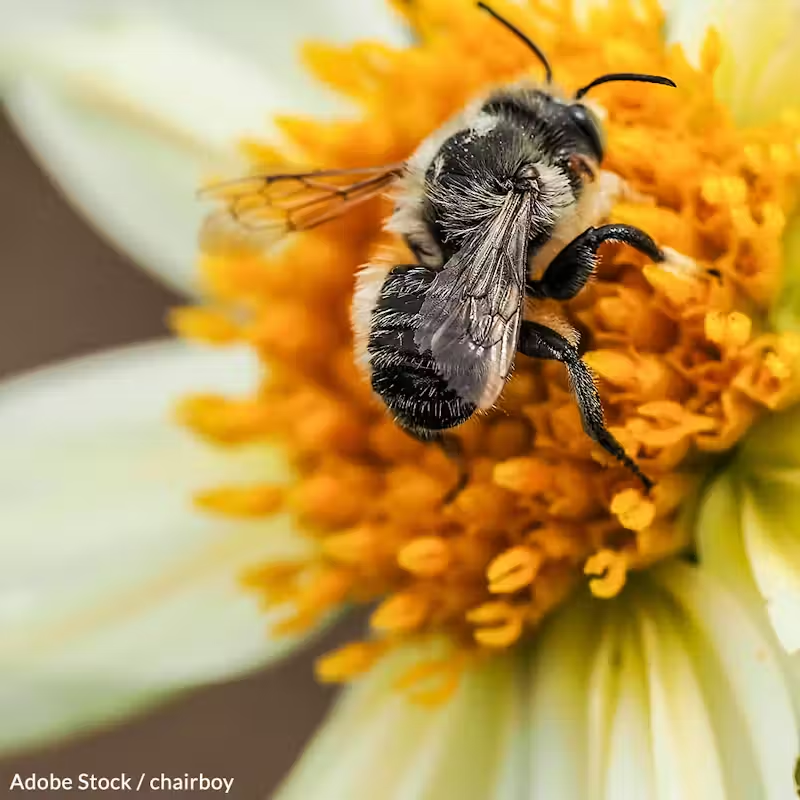Preserve Our Ecosystem and Save the Honeybees
41,289 signatures toward our 60,000 Goal
Sponsor: The Rainforest Site
Honeybee populations are in danger because they are ingesting a harmful pesticide called clothianidin. Take action for the bees!

Honeybees are vital to our life on Earth. They are critical to ecosystem success, providing food for amphibians, fish, birds, reptiles, and mammals. Insects play a role in decomposing animal wastes and dead vegetation, recycling the nutrients in these materials and returning them to the soil. Without bees, plants would not be able to reproduce and the core of our agricultural system would crumble.
Insecticides targeting crop-damaging pests reduce both the number and diversity of insects in an ecosystem1. With conventional farming practices relying primarily on chemical insecticides for pest insect management, ecosystems comprising US agricultural lands are highly impacted through both direct effects on insects and direct and indirect effects on other species2. Although many members of the ecosystem may not be exposed to sufficient doses of insecticides to suffer acutely lethal poisonings, sublethal and indirect adverse effects have been demonstrated to occur.
Right now is the time to take action in favor of saving our bees. Bee populations have begun to see sharp declines in recent years. There are several theories as to why this may be occurring, but the most widely-accepted is that neonicotinoid-based pesticides meant to protect us from other harmful bugs are having the unintended effect of killing off the bees.
Neonicotinoids are deadly to a wide range of insects, but they are safer for people and other mammals than an older family of insecticides called organophosphates. In recent years, farmers have rapidly increased their use of neonics3, which are generally applied at lower rates per acre; however, they are considerably more toxic to insects and generally persist longer in the environment4.
One of these chemicals, clothianidin, is very toxic to honeybees and has not been tested for its potential to leave trace chemicals on food.
Clothianidin impairs a bee colony's immune response and ability to reproduce, and especially threatens the lives of queen bees5. Bee colonies in clothianidin-treated fields produce up to 66% fewer males than colonies that weren't exposed to the chemical, and up to 74% fewer queen bees6.
Clothianidin can also lead to colony collapse disorder, or even make colonies less likely to clear out dead or sick bees from their hives, which means more bees can become infected over time7.
Sign the petition asking the EPA to ban clothianidin's use in agricultural and household applications.
- Turnbull, L A; Hector, A, Nature (2010), "Applied Ecology: How to get even with pests.."
- David Gibbons, Christy Morrissey & Pierre Mineau, Environmental Science and Pollution Research volume (2015), "A review of the direct and indirect effects of neonicotinoids and fipronil on vertebrate wildlife."
- Dan Charles, NPR (6 August 2019), "New Evidence Shows Popular Pesticides Could Cause Unintended Harm To Insects."
- Michael DiBartolomeis, Susan Kegley, Pierre Mineau, Rosemarie Radford, Kendra Klein, PLOS ONE (6 August 2019), "An assessment of acute insecticide toxicity loading (AITL) of chemical pesticides used on agricultural land in the United States."
- Michael DiBartolomeis, Susan Kegley, Pierre Mineau, Rosemarie Radford, Kendra Klein, PLOS ONE (6 August 2019), "An assessment of acute insecticide toxicity loading (AITL) of chemical pesticides used on agricultural land in the United States."
- Dimitry Wintermantel, Barbara Locke, Georg K. S. Andersson, Emilia Semberg, Eva Forsgren, Julia Osterman, Thorsten Rahbek Pedersen, Riccardo Bommarco, Henrik G. Smith, Maj Rundlöf, Joachim R. de Miranda, Nature Communications (2018), "Field-level clothianidin exposure affects bumblebees but generally not their pathogens."
- N. Tsvetkov, O. Samson-Robert, K. Sood, H. S. Patel, D. A. Malena, P. H. Gajiwala, P. Maciukiewicz, V. Fournier, A. Zayed, Science (30 June 2017), "Chronic exposure to neonicotinoids reduces honey bee health near corn crops."
- Thomas James Wood and Dave Goulson, Environmental Science and Pollution Research (7 June 2017), "The environmental risks of neonicotinoid pesticides: a review of the evidence post 2013."
The Petition:
Dear EPA Administrator,
I am writing to express my concern over the declining honeybee population. Since the mid 2000's, honeybees have experienced a steady decrease in their overall population. There are a few factors that could be contributing to this phenomenon, but the most compelling explanation has to do with a chemical called clothianidin.
Clothianidin is manufactured and used for general pest control in crops. While it does help kill off unwanted species of bugs, it's also threatening the honeybees' survival.
Even more disturbing is that clothianidin hasn't been properly tested and experimented upon enough to incite a widespread approval of its use. This means that both humans and useful bug species are consuming this substance while we lack a true knowledge of its effects.
Honeybees pollinate the crops that we enjoy every day — if they were no longer around to do so, plants' abilities to reproduce would be decimated. We need to make sure that the substances we put on our crops are not threatening other species of insects and animals. If we don't, we're simply trading one bad outcome for another.
Please see to it that clothianidin is banned for good, for the sake of the bees, and for the sake of all Americans.
Sincerely,
Updates:
On 6/20/2014, President Obama initiated a nationwide "Pollinator Health Task Force" that is dedicated to combating the severe losses sustained by honey bees and other major pollinators. In a Presidential Memorandum released by the Office of the Press Secretary, the President calls on the EPA to reassess the use of dangerous pesticides with a focus on their affect on pollinators. Tell the EPA to take this presidential mandate seriously and ban the use of deadly pesticides!